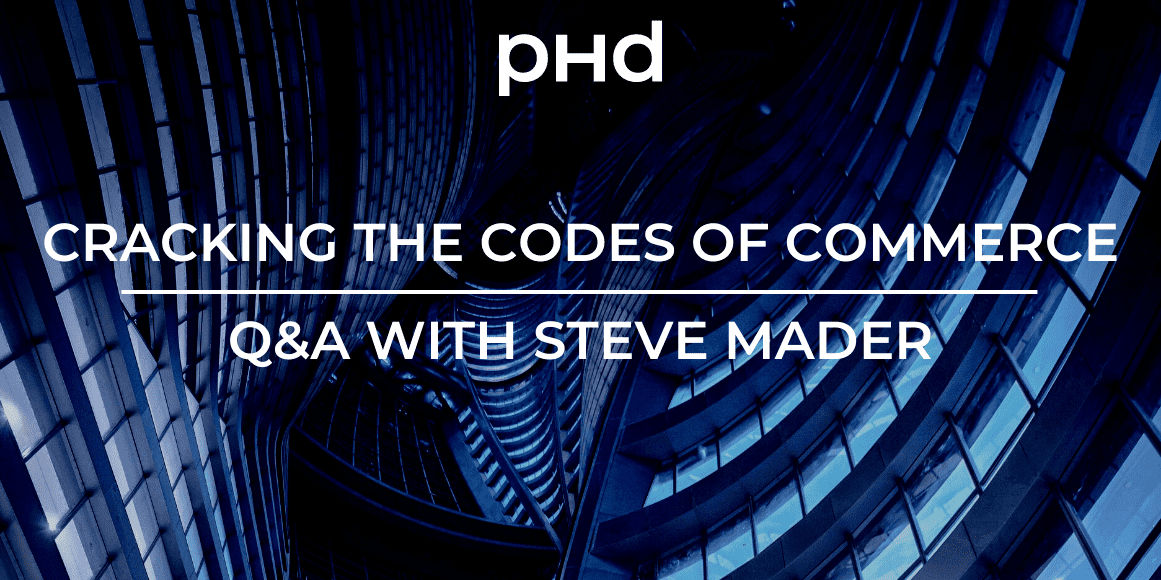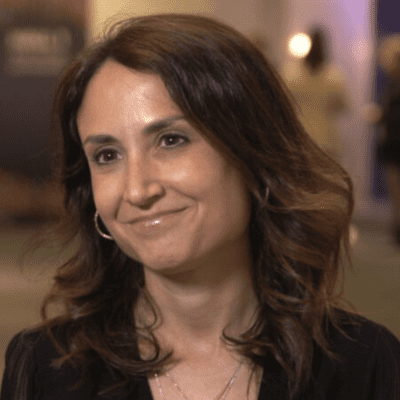Episode overview
Commerce is changing. Behavioural shifts during the pandemic pushed more people online and ecommerce saw 10 years of growth in 10 months.
To catch up, companies digitised 20-25 times faster in 2021 than the year before, and the fight to win consumers online – and in the real world – is now fiercer than ever.
But what can brands do to get commerce right? Is there a one-size-fits-all approach? And how will commerce change in the future?
To find out, we spoke with Steve Mader, Global Head of Commerce at PHD Global Business, to explore how commerce channels are evolving, unpack how to navigate common challenges, and discover how marketers can start developing advanced commerce capabilities, in their teams.
PHD: What does ‘commerce’ mean today?
Every brand is on a journey. Some are very media-led, so e-commerce could be driven out of the performance media side of the business. For other businesses, and some other brands that may be very commercially-led, it’s 100% led to the commercial function – and they have to beg borrow and steal media budget to amplify and grow and drive awareness for the products on commercial platforms.
When we think commerce, we need to be very specific that it is not just one team’s job. It’s not just the Amazon team. It’s not just a media team. It is a whole company initiative that the entire company has to get around because you can build amazing products, and detail pages; you can build amazing consumer experiences, but if you’re not in stock, that’s a challenge, so it has to be supply chain, inventory management, profitability, customer marketing, all the way through the way that we build a portfolio and build assortment and build new products. So, it’s an entire company initiative.
PHD: So why is it important that they need to keep commerce at the top of their priority list?
SM: I don’t want to say it has to be at the top of the priority list, because it sounds like “oh we must do all of the Amazon things and all of the e-grocery things…” and that is not always the case. Sometimes it’s an amazing growth vehicle, and sometimes it may not be right for that specific product or that specific niche, for example.
What we do have to help marketers keep in mind is that, regardless, if you’re going to market through commerce and that’s a source of your growth, it’s going to be an impact on the way that your shoppers are perceiving the category; that shoppers are participating in the discovery of new brands within that category, and it’s going to change the way that you have to think about budget allocation in the way that integrates objectives into the campaign brief that you provide your partners like PHD.
It’s incredibly important that we think through the funnel, and that’s just not media funnel; that includes customer marketing, trade marketing and product portfolio. Thinking about which of my portfolio, of my SKUs, I want to drive through Amazon, eBay, through e-grocery channels like Tesco or Walmart, or Instacart, because not every SKU is traded equally.
There are some SKUs which will perform better in ecommerce channels and we need to be flexible as marketers to find the right skew, the right product, for the right mission or occasion that shoppers are trying to accomplish.
PHD: What commerce challenges are marketers facing right now?
SM: It’s not just the on the media and the marketers’ side. There needs to be a fundamental approach to the way that we think about connections planning, media budget setting, investment planning and campaign strategy.
And that has to be based on sales and marketing teams coming together through learning and development, academy programs, and secondments, where the media team works with Amazon and the commercial teams build brand campaigns.
We need to get in and under the skin of how each other’s roles function. Because as soon as we do that, we’ll know where the gaps are and how we can help scale. That must be part of the DNA of how brands grow going forward.
PHD: How are you solving those challenges for your clients?
SM: We must focus on building incredible profitable growth in partnership together as a media agency and commercial and media marketing teams, but it’s not just one way.
It can’t just be “hey, we built a campaign. It’s amazing. Here’s support portfolio, go and efficiently sell it as much as we possibly can. It’s going to be great” without realizing that, along the way, it’s easy to grow through ecommerce channels – money goes in, money comes out – [but] it’s difficult to grow profitably through Ecommerce Channels.
That’s where the exciting piece comes in because, on the one hand, growth through ecom is great. But then it’s rewiring the business; where is that friction being created? Has it been in portfolio planning? Do we have a competitive price issue in some markets? Do we have an assortment segmentation challenge? Are we targeting the right audiences? Do we need to reallocate the budget at the right moment in time?
PHD: What advice do you have for marketers?
Take a salesperson out for coffee and understand what they are currently struggling with. Is it a cost price increase that they’re trying to push through? and at that moment in time doesn’t matter how much money you’re going to dump into that retail platform from a retail media point of view if you’re delisted because you have a commercial negotiation challenge at the moment. So, step one is to make a salesperson your best friend.
And then step two is to realize that from a shopper discovery consumer experience point of view, ecommerce channels are your new pack; it’s your new backup pack. It’s your new brand experience. It’s the wiki of products with the cliché term.
So, realize how your brand shows up on commerce channels, whether it’s a product detail page, a brand store on Amazon or an e-grocer, or just the assortment that you are curating based on a search term that is going to be a new barometer of your brand equity.
Understand what that looks like so that you can ensure that it is communicating the right narrative to that audience in the way that you originally intended. Only after that should you start trying to drive traffic and start building those full final campaigns around, you know, capturing existing demand, trying to curate the assortment in the right way based on missions and occasions and keywords, and then, ultimately, the top-of-funnel awareness driving. Only when you get the foundations right, do you then start doing the sexy stuff.
PHD: Are there any companies that are doing commerce well?
SM: I will always appreciate companies like Allbirds, for example, because they focus on their core assortment. They have their core portfolio SKUs, know what their niche is, and are very methodical and diligent about how to expand that portfolio.
I think they do a very good job and they’ve been layering in physical retail and then layering in shopping shop wholesale as they need to as well. So, it’s a very consistent but very good consumer experience.
We’ll always talk about Nike and what they’ve been doing. I think they have done a good job on distribution. I think they’ve done a great job from an experience point of view, a great job around hype, clearly, and they are dabbling in the metaverse, and NFT things interestingly and appropriately around acquisitions and building it out that way. So, if they’re going to experiment with the new stuff, let’s go all in.
Finally, and I can’t help myself, I used to work at LEGO, and I think they still do an amazing job. Both from a flagship store point of view, a D2C point of view, and a wholesale point of view. They do an incredible job at building an amazing consumer experience for kids, and the shoppers that help those kids have a different type of play experience.
PHD: What one thing do you want marketers to take away?
SM: I’m going to say ‘hey, you know what you should do? You should go work in a store for a little bit.’ You should, if you have a DTC store, go ask the store manager if you can go work in the store for a bit. If you work with a wholesale partner, go ask the commercial team if you can go do planner grabbing, inside of the grocer or inside of the department store for a couple of days, and I bet you would learn a lot about how shoppers navigate the category.




